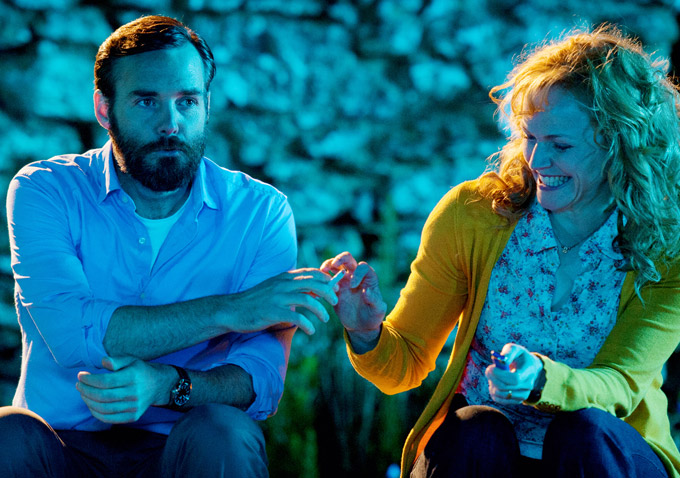 There’s acting and then there’s “acting.”
There’s acting and then there’s “acting.”
The first requires building credible characters and relationships, developing
organic conflicts within the framework of a concrete story. The second involves
loading up a story with excessive clutter that it drowns out any work of which the
actors are capable, turning them into drama automatons: it’s mostly reacting,
both removing the burden of work from most performers while also placing a
greater spotlight on their very presence, as they are forced to “react” instead
of act. This also helps illustrate the difference between drama and melodrama.
 That best captures the nature of “Run and Jump,” an Irish drama with a solid, touching central conceit. The first
That best captures the nature of “Run and Jump,” an Irish drama with a solid, touching central conceit. The first
scene finds beautiful Vanetia (Maxine Peake) driving her husband home after a
hospital stay following a stroke. Unfortunately, he’s now in a regressed mental
state similar to a child; Conor (Edward McLiam) now stares off into the distance and
babbles on in simplistic, unfinished sentences. Flashes of him are still
present: a smile, a touch, a caring gesture towards his teenage son and
preschool-aged daughter. But he’s very much like the tape player adapter in
Vanetia’s car when she attempts to play CD’s: in the opening scene, she wails
and smacks at it before it can properly play more than a snippet of The
Magnetic Fields’ “The Sun Goes Down And The World Goes Dancing.”
The film’s peppy, eclectic
soundtrack greatly adds to the mood upon visiting their house. Always stuffed with
visitors, this small cottage in the village entertains guests
sympathetic to Vanetia’s plight, though she doesn’t necessarily want sympathy. The
family eventually settles into a rhythm: moody Conor toils in his woodshop,
remembering his craft skills like a muscle memory. Meanwhile, Vanetia tends to
the house and children, including a precocious daughter. Only son Lenny (Brendan Morris) has an extraordinarily rough time of it, as he keeps a secret about being
bullied at school. At first it seems like he’s being hassled because of his
father’s mental state. The suggestive magazine cut-outs dotting his walls of
half-naked male swimmers, reflecting more than one of his interests, seems to
tell another story.
 Conor is also, in an
Conor is also, in an
unorthodox strategy, observed by an American doctor named Ted. Preparing a book
on similar conditions, Ted is constantly peering around the corner with a video
camera, observing the family dynamics and how this new Conor is fitting in.
His detachment is borderline surgical, as he attempts to maintain his distance
from family activity. When Vanetia finds a joint in his room, the situation
changes: Vanetia realizes the dead-serious Ted is a kindred spirit, and the two
of them enjoy after-hours snacks while everyone else is asleep, unaware that
this might be something of a budding romance.
Which it really shouldn’t be, of
course. Not just because Ted is a professional, but because their natural
attraction doesn’t have to be any more than that, given that Vanetia clearly
loves her family and husband, even in his vegetative state. In some movies, it
almost seems like romance is a default setting for couplings of men and women,
as if some of us couldn’t resist keeping it in our pants. What has been so well
established by these actors is that Vanetia is devoutly close to her husband,
while Ted is nothing if not married to his work.
 In a surprising casting choice,
In a surprising casting choice,
underneath Ted’s handsome beard is comedian Will Forte. Mostly a stranger to
dramatic work until now, Forte’s Ted has to warm from being wedded to the work
to suddenly growing warm to Vanetia’s affections, but also the family’s charms.
Again, his job is easier because the task requires not acting but “acting”:
there’s not much to play beyond the obvious emotions when a third act pivots on
both a death and an attempted suicide, as well as growing romance between
Vanetia and himself. For what it’s worth, Forte acquits himself well. His beard,
profession, and natural temperament recalls another withdrawn clown, Robin
Williams, in “Awakenings,” but Forte has a definite edge to his dramatic persona
similar to the one in his comedic characters. When he is observing listlessly,
his mouth is naturally crooked, as if he’s three seconds away from a sneer. It
helps establish Ted as devoted to his work above all else, to the point where
he’s coldly clinical about his relationships (he’s borderline robotic to a
family friend played by Sharon Horgan). The crookedness to his smiles and
frowns eventually vanish, but Forte, like most comedians, has a tougher time
reflecting the sincerity of his third-act shift into a nice guy.
“Run and Jump” has a similar
difficulty with that third act shift, as if it’s simply too much drama to
handle. The concern is, what is this film really about? The main focus bounces
so heavily between Vanetia’s relationship with her husband, his growing
awareness of his surroundings, and the budding feelings between Ted and Vanetia.
By the time these all clash in the final 30 minutes, the actors, and
characters, are barely given a chance to breathe. Perhaps that’s the
significance of the title, a physical embodiment of the permutations of this
particular story, though by the time we’ve reached the final scene, it’s made
literal. As if the film is telling us that these well-acted plot complications
were all designed to get us to this point, a film jerry-rigged with plot complications
specifically for one dramatic release. Despite the affecting drama and
performances, “Run and Jump” just never feels more that perfunctory in this
regards. [B]

